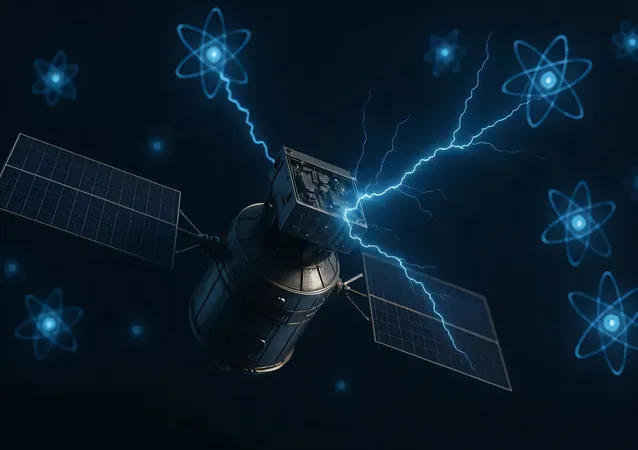
Revolutionary Bacteria 'Breathe' Rocks and Save Our Oceans!
2025-08-28
Author: Sarah
Groundbreaking Discovery of Iron-Breathing Bacteria
A pioneering international team of scientists, spearheaded by microbiologists Marc Mussmann and Alexander Loy from the University of Vienna, has unleashed an astonishing find in the microbial world: a new type of metabolism dubbed MISO bacteria. These remarkable microbes have the ability to 'breathe' iron minerals by oxidizing toxic hydrogen sulfide, turning a harmful substance into a lifeline for their growth.
The Hidden Role of Microbes in Element Cycles
Microbial life is a cornerstone of Earth's biogeochemical cycles, which dictate the transformation and movement of crucial elements like carbon, nitrogen, sulfur, and iron across our planet. These cycles are vital for regulating greenhouse gases and maintaining our climate's stability. Just as humans rely on oxygen to convert food into energy, these microorganisms utilize sulfur and iron—especially in oxygen-deprived settings like ocean floors and wetlands—to fuel their metabolic processes.
A Game-Changer for Wetlands and Marine Sediments
In environments where oxygen is scarce, such as wetlands and marine sediments, specialized microbes create hydrogen sulfide, a noxious gas notorious for its rotten egg odor. Traditionally, the biogeochemical models have viewed the interaction between sulfide and iron minerals as purely chemical—believing it resulted only in elemental sulfur and iron monosulfide. But the Vienna researchers shattered this misconception.
"We show that this environmentally significant reaction is much more than just chemistry—it's biological!" claims Alexander Loy, a leader in the research. The newly identified MISO process couples the reduction of iron(III) oxide with the oxidation of sulfide, directly producing sulfate and skipping traditional sulfur cycle steps.
Microbes vs. Chemistry: Who Wins?
In laboratory experiments with MISO bacteria, scientists discovered that these microorganisms outpace the chemical reaction, indicating they are the primary players in this process within natural environments. "Different bacteria and archaea possess the capacity for MISO, and they thrive in a variety of ecosystems—both natural and human-made," explains lead author Song-Can Chen. Remarkably, MISO could contribute to up to 7% of global sulfide oxidation to sulfate in marine sediments, driven by the influx of reactive iron from rivers and melting glaciers.
A Bright Future for Our Oceans
The groundbreaking research from the University of Vienna, funded by the Austrian Science Fund, unveils a previously undiscovered biological mechanism linking sulfur, iron, and carbon cycles in oxygen-poor environments. This remarkable finding underscores the genius of microorganisms and their critical role in maintaining Earth's element cycles—potentially helping to curb the spread of 'dead zones' in our oceans.
As Alexander Loy poignantly states, "This discovery emphasizes the ingenuity of microorganisms and their essential role in shaping global cycles that affect every corner of our planet."



 Brasil (PT)
Brasil (PT)
 Canada (EN)
Canada (EN)
 Chile (ES)
Chile (ES)
 Česko (CS)
Česko (CS)
 대한민국 (KO)
대한민국 (KO)
 España (ES)
España (ES)
 France (FR)
France (FR)
 Hong Kong (EN)
Hong Kong (EN)
 Italia (IT)
Italia (IT)
 日本 (JA)
日本 (JA)
 Magyarország (HU)
Magyarország (HU)
 Norge (NO)
Norge (NO)
 Polska (PL)
Polska (PL)
 Schweiz (DE)
Schweiz (DE)
 Singapore (EN)
Singapore (EN)
 Sverige (SV)
Sverige (SV)
 Suomi (FI)
Suomi (FI)
 Türkiye (TR)
Türkiye (TR)
 الإمارات العربية المتحدة (AR)
الإمارات العربية المتحدة (AR)